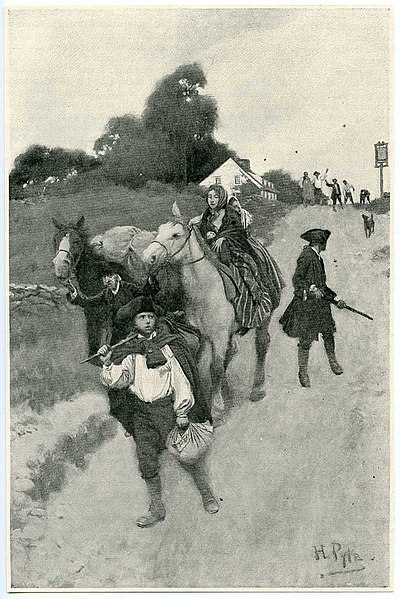Loyalist (American Revolution)
Loyalists were colonists in the Thirteen Colonies who remained loyal to the British Crown during the American Revolutionary War, often referred to as Tories, Royalists or King's Men at the time. They were opposed by the Patriots, who supported the revolution, and called them "persons inimical to the liberties of America."
Britannia offers solace and a promise of compensation for her exiled American-born British Loyalists. (Reception of the American Loyalists by Great Britain in the Year 1783, engraving by Henry Moses after a painting by Benjamin West.)
A jury finding from Kentucky County, Virginia in July 1780, confiscating lands of two men adjudged to be British subject. Daniel Boone was listed as a member of the jury.
Johnson Hall, seat of Sir John Johnson in the Mohawk Valley
Tory Refugees on their way to Canada by Howard Pyle
The Thirteen Colonies were a group of British colonies on the Atlantic coast of North America during the 17th and 18th centuries. Grievances against the imperial government led the 13 colonies to begin uniting in 1774, and expelling British officials by 1775. Assembled at the Second Continental Congress in Philadelphia, they appointed George Washington as commander-in-chief of the Continental Army to fight the American Revolutionary War. In 1776, Congress adopted the Declaration of Independence as the United States of America. Defeating British armies with French help, the Thirteen Colonies gained sovereignty with the Treaty of Paris in 1783.
The Thirteen Colonies of British America: (Dark Red): New England Colonies (Red-Brown): Middle Colonies (Brown): Southern Colonies
Join, or Die by Benjamin Franklin was recycled to encourage the former colonies to unite against British rule.






